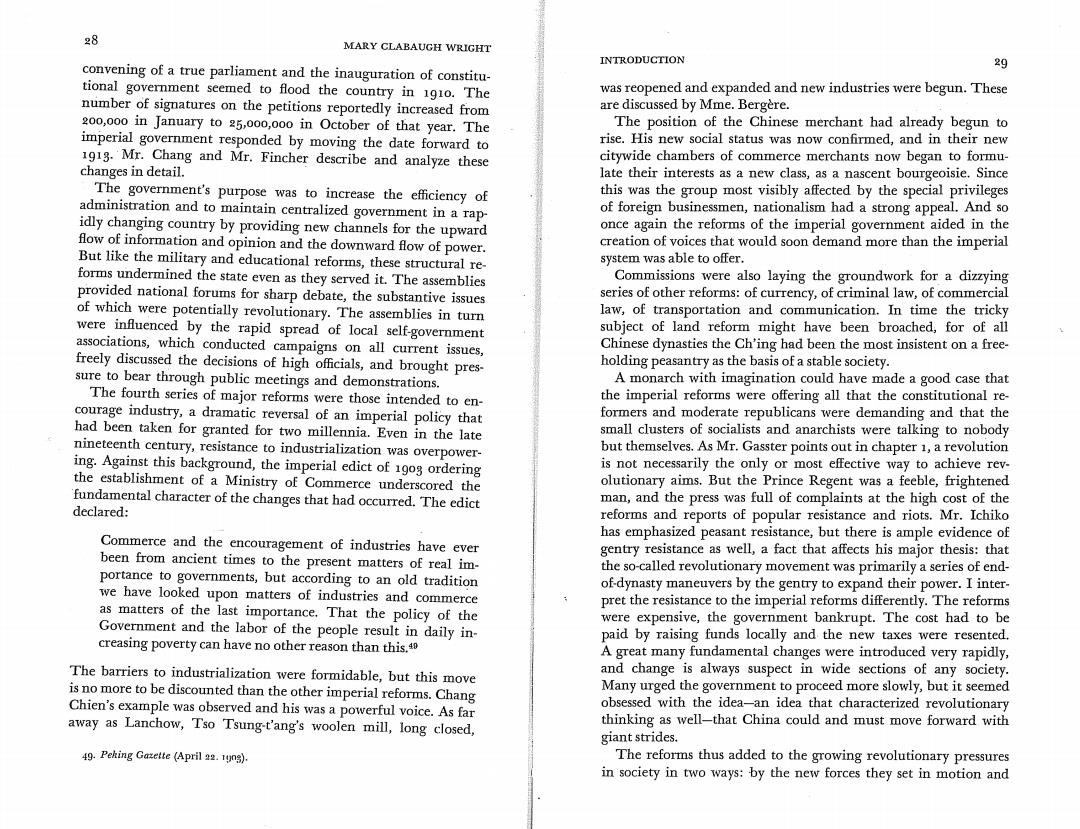
28 MARY CLABAUGH WRIGHT INTRODUCTION convening of a true parliament and the inauguration of constitu- 29 tional government seemed to flood the country in 1910.The was reopened and expanded and new industries were begun.These number of signatures on the petitions reportedly increased from are discussed by Mme.Bergere. 200,00o in January to 25,000,000 in October of that year.The The position of the Chinese merchant had already begun to imperial government responded by moving the date forward to rise.His new social status was now confirmed,and in their new 1913.Mr.Chang and Mr.Fincher describe and analyze these citywide chambers of commerce merchants now began to formu- changes in detail. late their interests as a new class,as a nascent bourgeoisie.Since The government's purpose was to increase the efficiency of this was the group most visibly affected by the special privileges administration and to maintain centralized government in a rap- of foreign businessmen,nationalism had a strong appeal.And so idly changing country by providing new channels for the upward once again the reforms of the imperial government aided in the flow of information and opinion and the downward flow of power. creation of voices that would soon demand more than the imperial But like the military and educational reforms,these structural re- system was able to offer. forms undermined the state even as they served it.The assemblies Commissions were also laying the groundwork for a dizzying provided national forums for sharp debate,the substantive issues series of other reforms:of currency,of criminal law,of commercial of which were potentially revolutionary.The assemblies in turn law,of transportation and communication.In time the tricky were influenced by the rapid spread of local self-government subject of land reform might have been broached,for of all associations,which conducted campaigns on all current issues, Chinese dynasties the Ch'ing had been the most insistent on a free- freely discussed the decisions of high officials,and brought pres- holding peasantry as the basis of a stable society. sure to bear through public meetings and demonstrations. A monarch with imagination could have made a good case that The fourth series of major reforms were those intended to en- the imperial reforms were offering all that the constitutional re- courage industry,a dramatic reversal of an imperial policy that formers and moderate republicans were demanding and that the had been taken for granted for two millennia.Even in the late small clusters of socialists and anarchists were talking to nobody nineteenth century,resistance to industrialization was overpower- but themselves.As Mr.Gasster points out in chapter 1,a revolution ing.Against this background,the imperial edict of 19o3 ordering is not necessarily the only or most effective way to achieve rev- the establishment of a Ministry of Commerce underscored the olutionary aims.But the Prince Regent was a feeble,frightened fundamental character of the changes that had occurred.The edict man,and the press was full of complaints at the high cost of the declared: reforms and reports of popular resistance and riots.Mr.Ichiko Commerce and the encouragement of industries have ever has emphasized peasant resistance,but there is ample evidence of been from ancient times to the present matters of real im- gentry resistance as well,a fact that affects his major thesis:that the so-called revolutionary movement was primarily a series of end- portance to governments,but according to an old tradition we have looked upon matters of industries and commerce of-dynasty maneuvers by the gentry to expand their power.I inter- pret the resistance to the imperial reforms differently.The reforms as matters of the last importance.That the policy of the Government and the labor of the people result in daily in- were expensive,the government bankrupt.The cost had to be paid by raising funds locally and the new taxes were resented. creasing poverty can have no other reason than this.40 A great many fundamental changes were introduced very rapidly, The barriers to industrialization were formidable,but this move and change is always suspect in wide sections of any society. is no more to be discounted than the other imperial reforms.Chang Many urged the government to proceed more slowly,but it seemed Chien's example was observed and his was a powerful voice.As far obsessed with the idea-an idea that characterized revolutionary away as Lanchow,Tso Tsung-t'ang's woolen mill,long closed, thinking as well-that China could and must move forward with giant strides. 49.Pehing Gazette (April a2.) The reforms thus added to the growing revolutionary pressures in society in two ways:by the new forces they set in motion and
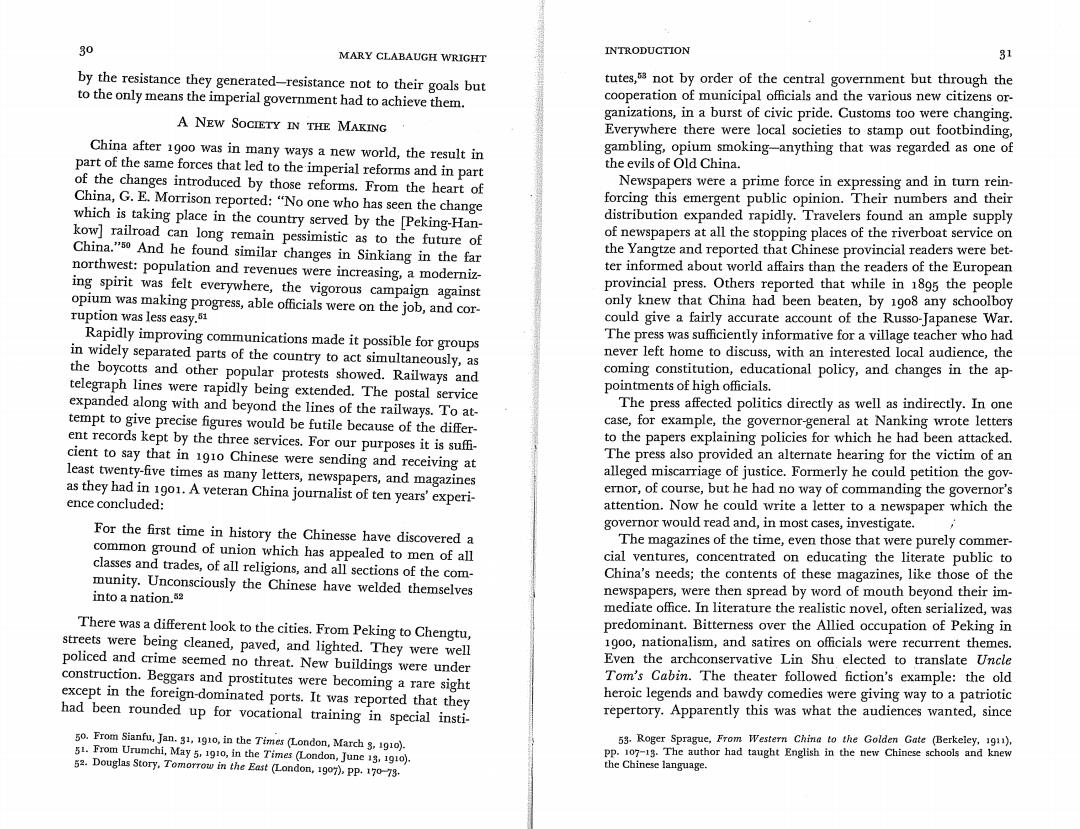
30 MARY CLABAUGH WRIGHT INTRODUCTION 31 by the resistance they generated-resistance not to their goals but tutes,s not by order of the central government but through the to the only means the imperial government had to achieve them. cooperation of municipal officials and the various new citizens or- A NEW SOCIETY IN TH亚MAKING ganizations,in a burst of civic pride.Customs too were changing. Everywhere there were local societies to stamp out footbinding, China after 1goo was in many ways a new world,the result in gambling,opium smoking-anything that was regarded as one of part of the same forces that led to the imperial reforms and in part the evils of Old China. of the changes introduced by those reforms.From the heart of Newspapers were a prime force in expressing and in turn rein- China,G.E.Morrison reported:"No one who has seen the change forcing this emergent public opinion.Their numbers and their which is taking place in the country served by the [Peking-Han- distribution expanded rapidly.Travelers found an ample supply kow]railroad can long remain pessimistic as to the future of of newspapers at all the stopping places of the riverboat service on China.50 And he found similar changes in Sinkiang in the far the Yangtze and reported that Chinese provincial readers were bet- northwest:population and revenues were increasing,a moderniz- ter informed about world affairs than the readers of the European ing spirit was felt everywhere,the vigorous campaign against provincial press.Others reported that while in 1895 the people opium was making progress,able officials were on the job,and cor- only knew that China had been beaten,by 1g08 any schoolboy ruption was less easy.51 could give a fairly accurate account of the Russo-Japanese War. Rapidly improving communications made it possible for groups The press was sufficiently informative for a village teacher who had in widely separated parts of the country to act simultaneously,as never left home to discuss,with an interested local audience,the the boycotts and other popular protests showed.Railways and coming constitution,educational policy,and changes in the ap- telegraph lines were rapidly being extended.The postal service pointments of high officials. expanded along with and beyond the lines of the railways.To at- The press affected politics directly as well as indirectly.In one tempt to give precise figures would be futile because of the differ- case,for example,the governor-general at Nanking wrote letters ent records kept by the three services.For our purposes it is suffi- to the papers explaining policies for which he had been attacked. cient to say that in 1910 Chinese were sending and receiving at The press also provided an alternate hearing for the victim of an least twenty-five times as many letters,newspapers,and magazines alleged miscarriage of justice.Formerly he could petition the gov- as they had in 1901.A veteran China journalist of ten years'experi- ernor,of course,but he had no way of commanding the governor's ence concluded: attention.Now he could write a letter to a newspaper which the For the first time in history the Chinesse have discovered a governor would read and,in most cases,investigate. common ground of union which has appealed to men of all The magazines of the time,even those that were purely commer- classes and trades,of all religions,and all sections of the com- cial ventures,concentrated on educating the literate public to munity.Unconsciously the Chinese have welded themselves China's needs;the contents of these magazines,like those of the into a nation.53 newspapers,were then spread by word of mouth beyond their im- mediate office.In literature the realistic novel,often serialized,was There was a different look to the cities.From Peking to Chengtu, predominant.Bitterness over the Allied occupation of Peking in streets were being cleaned,paved,and lighted.They were well 1g00,nationalism,and satires on officials were recurrent themes. policed and crime seemed no threat.New buildings were under Even the archconservative Lin Shu elected to translate Uncle construction.Beggars and prostitutes were becoming a rare sight Tom's Cabin.The theater followed fiction's example:the old except in the foreign-dominated ports.It was reported that they heroic legends and bawdy comedies were giving way to a patriotic had been rounded up for vocational training in special insti. repertory.Apparently this was what the audiences wanted,since 50.From Sianfu,Jan.31,1910,in the Times(London,March S.1910). 53.Roger Sprague,From Western China to the Golden Gate (Berkeley,1911) 51.From Urumchi,May 5,1910,in the Times (London,June 13.1g10) pp.107-13.The author had taught English in the new Chincse schools and knew 52.Douglas Story.Tomorrow in the East (London,1g07).pp.170-78. the Chinese language
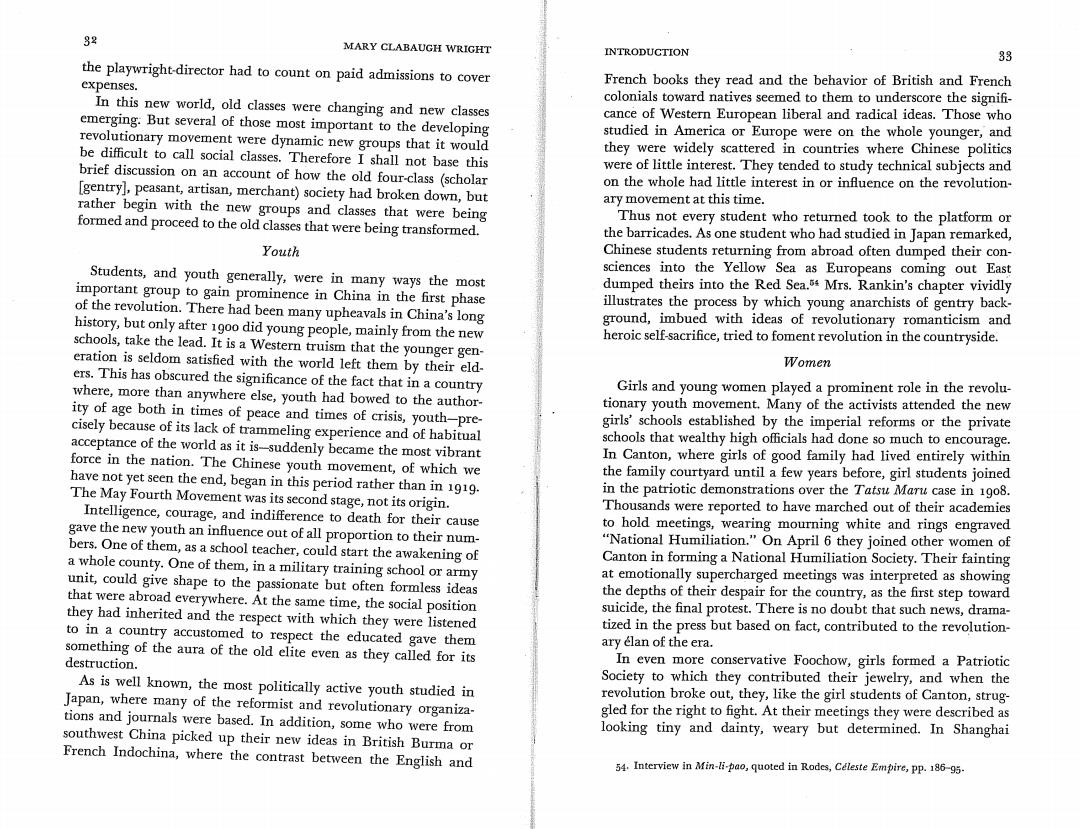
3? MARY CLABAUGH WRIGHT INTRODUCTION 83 the playwright-director had to count on paid admissions to cover expenses. French books they read and the behavior of British and French In this new world,old classes were changing and new classes colonials toward natives seemed to them to underscore the signifi- emerging.But several of those most important to the developing cance of Western European liberal and radical ideas.Those who revolutionary movement were dynamic new groups that it would studied in America or Europe were on the whole younger,and be difficult to call social classes.Therefore I shall not base this they were widely scattered in countries where Chinese politics brief discussion on an account of how the old four-class (scholar were of little interest.They tended to study technical subjects and [gentry],peasant,artisan,merchant)society had broken down,but on the whole had little interest in or influence on the revolution- rather begin with the new groups and classes that were being ary movement at this time. formed and proceed to the old classes that were being transformed. Thus not every student who returned took to the platform or the barricades.As one student who had studied in Japan remarked, Youth Chinese students returning from abroad often dumped their con- Students,and youth generally,were in many ways the most sciences into the Yellow Sea as Europeans coming out East important group to gain prominence in China in the first phase dumped theirs into the Red Sea.Mrs.Rankin's chapter vividly of the revolution.There had been many upheavals in China's long illustrates the process by which young anarchists of gentry back- history,but only after 1goo did young people,mainly from the new ground,imbued with ideas of revolutionary romanticism and schools,take the lead.It is a Western truism that the younger gen- heroic self-sacrifice,tried to foment revolution in the countryside. eration is seldom satisfied with the world left them by their eld Women ers.This has obscured the significance of the fact that in a country where,more than anywhere else,youth had bowed to the author- Girls and young women played a prominent role in the revolu- ity of age both in times of peace and times of crisis,youth-pre- tionary youth movement.Many of the activists attended the new cisely because of its lack of trammeling experience and of habitual girls'schools established by the imperial reforms or the private acceptance of the world as it is-suddenly became the most vibrant schools that wealthy high officials had done so much to encourage. force in the nation.The Chinese youth movement,of which we In Canton,where girls of good family had lived entirely within have not yet seen the end,began in this period rather than in 1919. the family courtyard until a few years before,girl students joined The May Fourth Movement was its second stage,not its origin. in the patriotic demonstrations over the Tatsu Maru case in 19o8. Intelligence,courage,and indifference to death for their cause Thousands were reported to have marched out of their academies gave the new youth an infuence out of all proportion to their num- to hold meetings,wearing mourning white and rings engraved bers.One of them,as a school teacher,could start the awakening of "National Humiliation."On April 6 they joined other women of a whole county.One of them,in a military training school or army Canton in forming a National Humiliation Society.Their fainting unit,could give shape to the passionate but often formless ideas at emotionally supercharged meetings was interpreted as showing that were abroad everywhere.At the same time,the social position the depths of their despair for the country,as the first step toward they had inherited and the respect with which they were listened suicide,the final protest.There is no doubt that such news,drama- to in a country accustomed to respect the educated gave them tized in the press but based on fact,contributed to the revolution- something of the aura of the old elite even as they called for its ary clan of the era. destruction. In even more conservative Foochow,girls formed a Patriotic As is well known,the most politically active youth studied in Society to which they contributed their jewelry,and when the Japan,where many of the reformist and revolutionary organiza- revolution broke out,they,like the girl students of Canton,strug- tions and journals were based.In addition,some who were from gled for the right to fight.At their meetings they were described as southwest China picked up their new ideas in British Burma or looking tiny and dainty,weary but determined.In Shanghai French Indochina,where the contrast between the English and 54.Interview in Min-li-pao,quoted in Rodes,Celeste Empire,pp.186-95
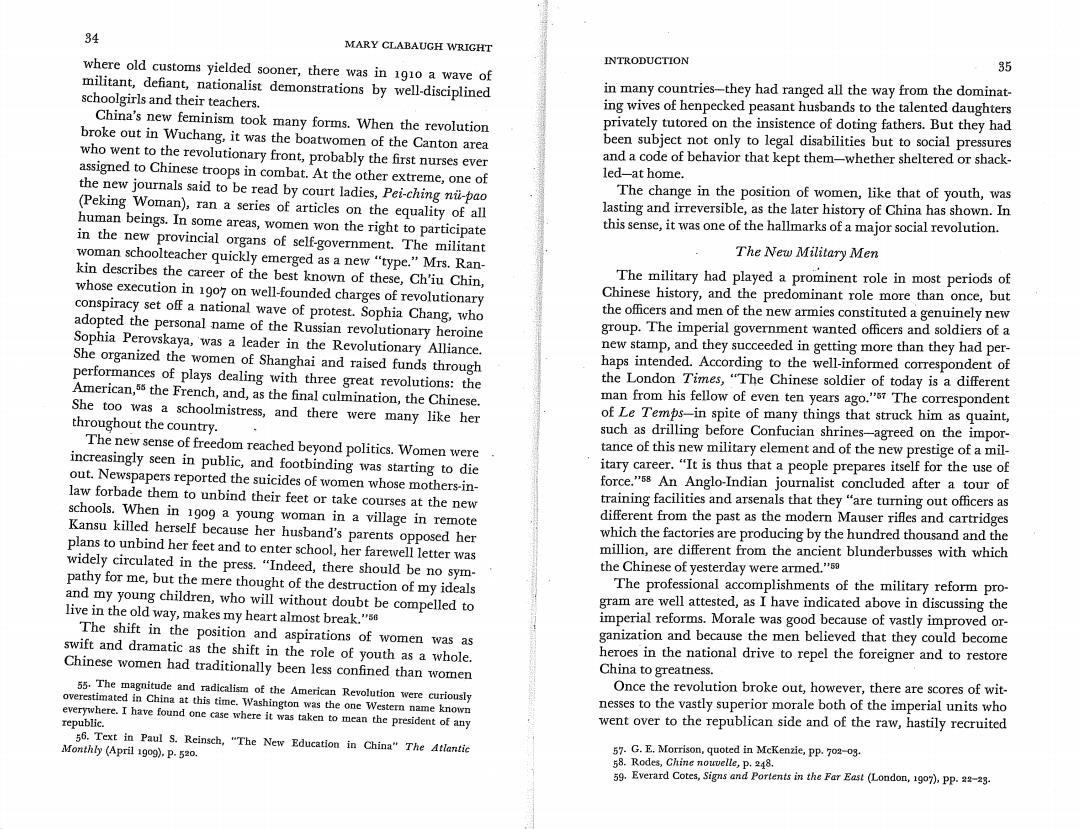
34 MARY CLABAUGH WRIGHT where old customs yielded sooner,there was in 1g10 a wave of INTRODUCTION 35 militant,defiant,nationalist demonstrations by well-disciplined schoolgirls and their teachers. in many countries-they had ranged all the way from the dominat- China's new feminism took many forms.When the revolution ing wives of henpecked peasant husbands to the talented daughters broke out in Wuchang,it was the boatwomen of the Canton area privately tutored on the insistence of doting fathers.But they had who went to the revolutionary front,probably the first nurses ever been subject not only to legal disabilities but to social pressures assigned to Chinese troops in combat.At the other extreme,one of and a code of behavior that kept them-whether sheltered or shack- led-at home. the new journals said to be read by court ladies,Pei-ching nii-pao (Peking Woman),ran a series of articles on the equality of all The change in the position of women,like that of youth,was human beings.In some areas,women won the right to participate lasting and irreversible,as the later history of China has shown.In in the new provincial organs of self-government.The militant this sense,it was one of the hallmarks of a major social revolution. woman schoolteacher quickly emerged as a new "type."Mrs.Ran- The New Military Men kin describes the career of the best known of these,Ch'iu Chin, whose execution in 19o7 on well-founded charges of revolutionary The military had played a prominent role in most periods of conspiracy set off a national wave of protest.Sophia Chang,who Chinese history,and the predominant role more than once,but adopted the personal name of the Russian revolutionary heroine the officers and men of the new armies constituted a genuinely new Sophia Perovskaya,was a leader in the Revolutionary Alliance. group.The imperial government wanted officers and soldiers of a She organized the women of Shanghai and raised funds through new stamp,and they succeeded in getting more than they had per- performances of plays dealing with three great revolutions:the haps intended.According to the well-informed correspondent of American,55 the French,and,as the final culmination,the Chinese. the London Times,"The Chinese soldier of today is a different She too was a schoolmistress,and there were many like her man from his fellow of even ten years ago."57 The correspondent throughout the country. of Le Temps-in spite of many things that struck him as quaint, The new sense of freedom reached beyond politics.Women were such as drilling before Confucian shrines-agreed on the impor- increasingly seen in public,and footbinding was starting to die tance of this new military element and of the new prestige of a mil- out.Newspapers reported the suicides of women whose mothers-in- itary career."It is thus that a people prepares itself for the use of law forbade them to unbind their feet or take courses at the new force."58 An Anglo-Indian journalist concluded after a tour of schools.When in 1gog a young woman in a village in remote training facilities and arsenals that they"are turning out officers as Kansu killed herself because her husband's parents opposed her different from the past as the modern Mauser rifles and cartridges plans to unbind her feet and to enter school,her farewell letter was which the factories are producing by the hundred thousand and the widely circulated in the press."Indeed,there should be no sym- million,are different from the ancient blunderbusses with which the Chinese of yesterday were armed."5 pathy for me,but the mere thought of the destruction of my ideals and my young children,who will without doubt be compelled to The professional accomplishments of the military reform pro- live in the old way,makes my heart almost break."5 gram are well attested,as I have indicated above in discussing the The shift in the position and aspirations of women was as imperial reforms.Morale was good because of vastly improved or- swift and dramatic as the shift in the role of youth as a whole. ganization and because the men believed that they could become Chinese women had traditionally been less confined than women heroes in the national drive to repel the foreigner and to restore China to greatness. 55.The magnitude and radicalism of the American Revolution were curiously Once the revolution broke out,however,there are scores of wit- overestimated in China at this time.Washington was the one Western name known everywhere.I have found one case where it was taken to mean the president of any nesses to the vastly superior morale both of the imperial units who republic. went over to the republican side and of the raw,hastily recruited 56.Text in Paul S.Reinsch,"The New Education in China"The Atlantic Monthly (April igog).p.520. 57.G.E.Morrison,quoted in McKenzie,pp.7oa-08. 58.Rodes,Chine nouvelle,p.248. 59.Everard Cotes,Signs and Portents in the Far East(London,17),Pp.3
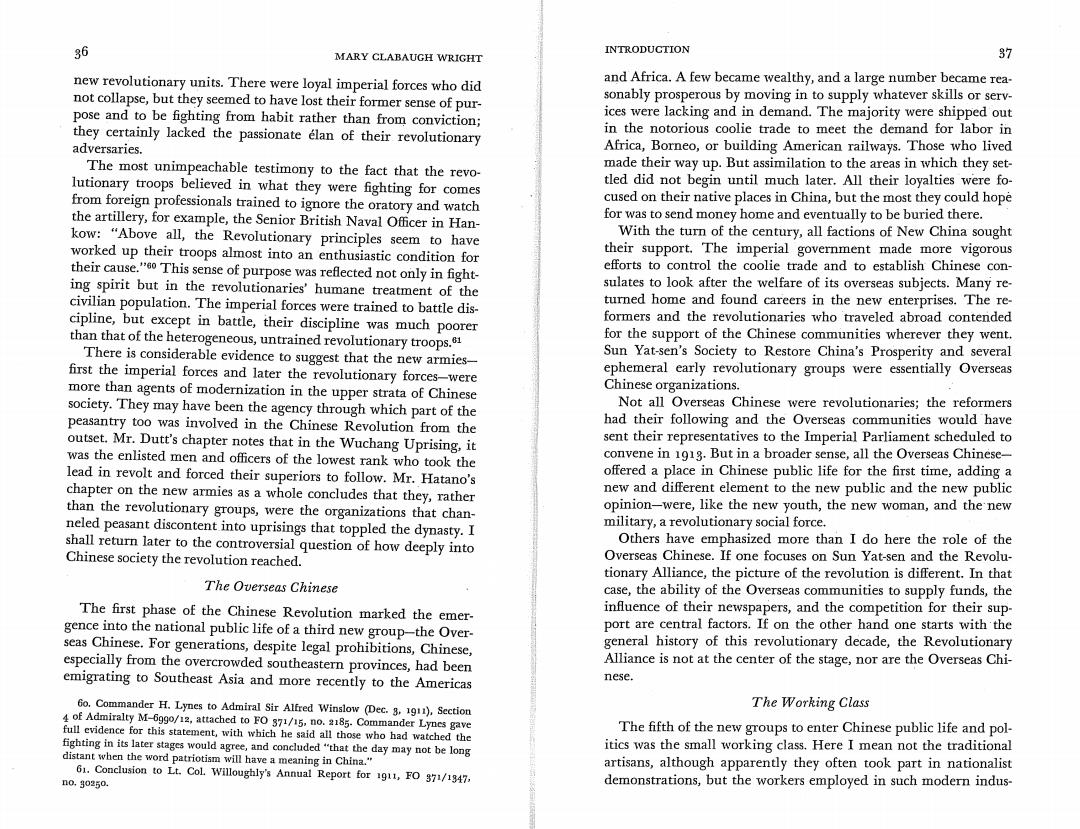
36 MARY CLABAUGH WRIGHT INTRODUCTION 37 new revolutionary units.There were loyal imperial forces who did and Africa.A few became wealthy,and a large number became rea- not collapse,but they seemed to have lost their former sense of pur- sonably prosperous by moving in to supply whatever skills or serv- pose and to be fighting from habit rather than from conviction; ices were lacking and in demand.The majority were shipped out they certainly lacked the passionate elan of their revolutionary in the notorious coolie trade to meet the demand for labor in adversaries. Africa,Borneo,or building American railways.Those who lived The most unimpeachable testimony to the fact that the revo- made their way up.But assimilation to the areas in which they set- lutionary troops believed in what they were fighting for comes tled did not begin until much later.All their loyalties were fo- from foreign professionals trained to ignore the oratory and watch cused on their native places in China,but the most they could hope the artillery,for example,the Senior British Naval Officer in Han- for was to send money home and eventually to be buried there. kow:"Above all,the Revolutionary principles seem to have With the turn of the century,all factions of New China sought worked up their troops almost into an enthusiastic condition for their support.The imperial government made more vigorous their cause."0 This sense of purpose was reflected not only in fight- efforts to control the coolie trade and to establish Chinese con- ing spirit but in the revolutionaries'humane treatment of the sulates to look after the welfare of its overseas subjects.Many re- civilian population.The imperial forces were trained to battle dis- turned home and found careers in the new enterprises.The re- cipline,but except in battle,their discipline was much poorer formers and the revolutionaries who traveled abroad contended than that of the heterogeneous,untrained revolutionary troops.1 for the support of the Chinese communities wherever they went. There is considerable evidence to suggest that the new armies- Sun Yat-sen's Society to Restore China's Prosperity and several first the imperial forces and later the revolutionary forces-were ephemeral early revolutionary groups were essentially Overseas more than agents of modernization in the upper strata of Chinese Chinese organizations. society.They may have been the agency through which part of the Not all Overseas Chinese were revolutionaries;the reformers peasantry too was involved in the Chinese Revolution from the had their following and the Overseas communities would have outset.Mr.Dutt's chapter notes that in the Wuchang Uprising,it sent their representatives to the Imperial Parliament scheduled to was the enlisted men and officers of the lowest rank who took the convene in 1913.But in a broader sense,all the Overseas Chinese- lead in revolt and forced their superiors to follow.Mr.Hatano's offered a place in Chinese public life for the first time,adding a chapter on the new armies as a whole concludes that they,rather new and different element to the new public and the new public than the revolutionary groups,were the organizations that chan- opinion-were,like the new youth,the new woman,and the new neled peasant discontent into uprisings that toppled the dynasty.I military,a revolutionary social force. shall return later to the controversial question of how deeply into Others have emphasized more than I do here the role of the Chinese society the revolution reached. Overseas Chinese.If one focuses on Sun Yat-sen and the Revolu- tionary Alliance,the picture of the revolution is different.In that The Overseas Chinese case,the ability of the Overseas communities to supply funds,the The first phase of the Chinese Revolution marked the emer- influence of their newspapers,and the competition for their sup- gence into the national public life of a third new group-the Over- port are central factors.If on the other hand one starts with the seas Chinese.For generations,despite legal prohibitions,Chinese, general history of this revolutionary decade,the Revolutionary especially from the overcrowded southeastern provinces,had been Alliance is not at the center of the stage,nor are the Overseas Chi- emigrating to Southeast Asia and more recently to the Americas nese. 6o.Commander H.Lynes to Admiral Sir Alfred Winslow (Dec.8.1911),Section The Working Class 4 of Admiralty M-6ggo/12,attached to FO 871/15,no.2185.Commander Lynes gave full evidence for this statement,with which he said all those who had watched the The fifth of the new groups to enter Chinese public life and pol- fighting in its later stages would agree,and concluded"that the day may not be long itics was the small working class.Here I mean not the traditional distant when the word patriotism will have a meaning in China." 61.Conclusion to Lt.CoL Willoughly's Annual Report for 1911,FO 371/1847, artisans,although apparently they often took part in nationalist n0,30250. demonstrations,but the workers employed in such modern indus-